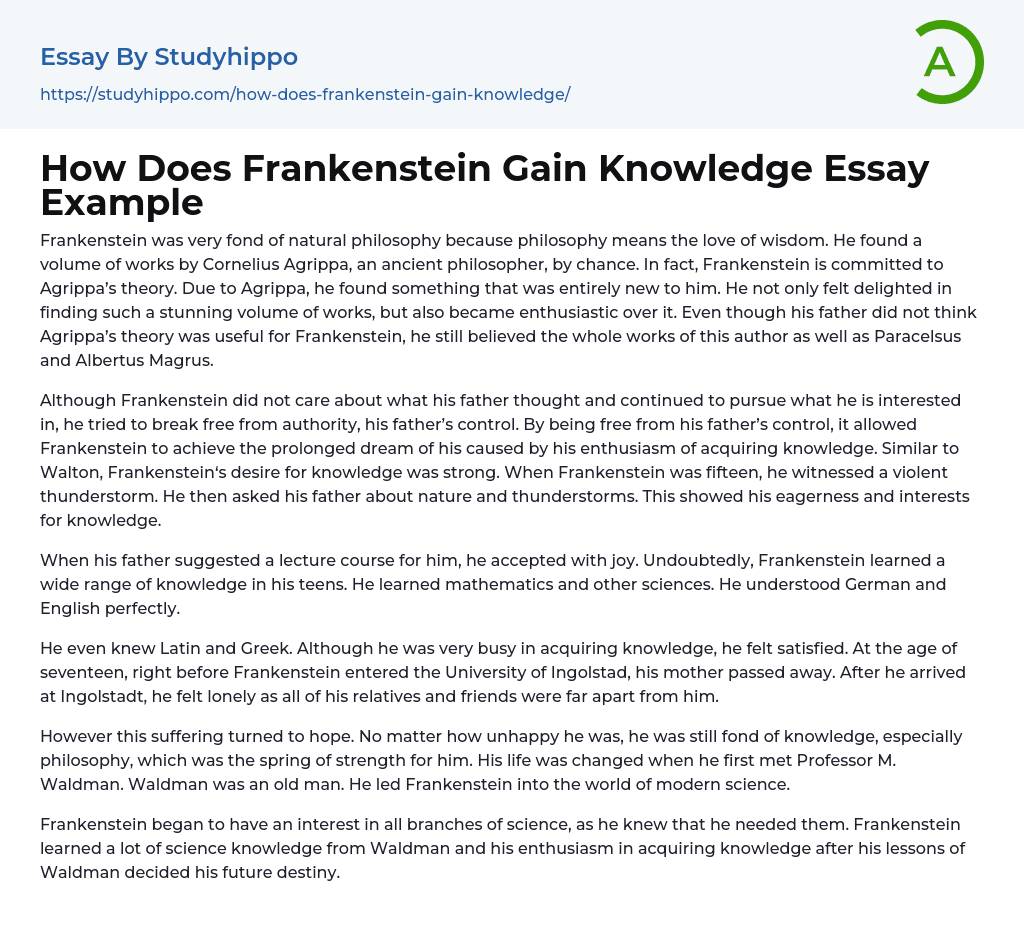Frankenstein was very fond of natural philosophy because philosophy means the love of wisdom. He found a volume of works by Cornelius Agrippa, an ancient philosopher, by chance. In fact, Frankenstein is committed to Agrippa’s theory. Due to Agrippa, he found something that was entirely new to him. He not only felt delighted in finding such a stunning volume of works, but also became enthusiastic over it. Even though his father did not think Agrippa’s theory was useful for Frankenstein, he still believed the whole works of this author as well as Paracelsus and Albertus Magrus.
Although Frankenstein did not care about what his father thought and continued to pursue what he is interested in, he tried to break free from authority, his father’s control. By being free from his father’s control, it allowed Frankenstein to achieve the prolonged dream of his caused by
...his enthusiasm of acquiring knowledge. Similar to Walton, Frankenstein‘s desire for knowledge was strong. When Frankenstein was fifteen, he witnessed a violent thunderstorm. He then asked his father about nature and thunderstorms. This showed his eagerness and interests for knowledge.
When his father suggested a lecture course for him, he accepted with joy. Undoubtedly, Frankenstein learned a wide range of knowledge in his teens. He learned mathematics and other sciences. He understood German and English perfectly.
He even knew Latin and Greek. Although he was very busy in acquiring knowledge, he felt satisfied. At the age of seventeen, right before Frankenstein entered the University of Ingolstad, his mother passed away. After he arrived at Ingolstadt, he felt lonely as all of his relatives and friends were far apart from him.
However this suffering turne
to hope. No matter how unhappy he was, he was still fond of knowledge, especially philosophy, which was the spring of strength for him. His life was changed when he first met Professor M. Waldman. Waldman was an old man. He led Frankenstein into the world of modern science.
Frankenstein began to have an interest in all branches of science, as he knew that he needed them. Frankenstein learned a lot of science knowledge from Waldman and his enthusiasm in acquiring knowledge after his lessons of Waldman decided his future destiny.
- Age Of Enlightenment essays
- Ethos essays
- Time essays
- Acceptance essays
- Meaning Of Life essays
- Reality essays
- Natural Law essays
- Political Philosophy essays
- Utilitarianism essays
- Existence essays
- Free Will essays
- Good And Evil essays
- Confucianism essays
- Relativism essays
- Conscience essays
- Environmentalism essays
- Empiricism essays
- Epistemology essays
- Ethics essays
- Existentialism essays
- Human Nature essays
- Individualism essays
- Metaphysics essays
- Philosophy Of Life essays
- Transcendentalism essays
- Truth essays
- Destiny essays
- Determinism essays
- Fate essays
- Functionalism essays
- Philosophers essays
- Pragmatism essays
- Future essays
- Child Observation essays
- Critical Reflection essays
- Teaching Philosophy essays
- Personal Philosophy essays
- Action Speak Louder Than Words essays
- Can Money Buy Happiness essays
- Values of Life essays
- Ethical dilemma essays
- Normative Ethics essays
- Virtue Ethics essays
- Belief essays
- Deontology essays
- Moral essays
- Virtue essays
- Work Ethic essays
- Henry David Thoreau essays
- Carl Jung essays




